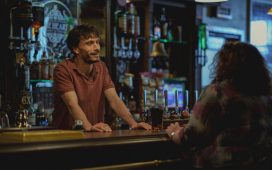“My god, you will ruin the good name of Dickinson!”
This is Edward Dickinson (Toby Huss), father of Emily (Hailee Steinfeld), in the debut episode of the Apple TV+ series that bears their family moniker. Dickinson is a mess, albeit an entertaining one. But it’s unlikely to ruin the good name of one of America’s greatest poets, because the people most apt to enjoy it are probably the ones with the least interest in Dickinson herself.
The series, created by playwright Alena Smith, takes place in and around the Dickinson family home in Amherst in the middle of the 19th century. Emily is a teenager, chafing under Edward’s refusal to let her publish her poetry, and her mother (also named Emily, played by Jane Krakowski) pushing her to master housework like sister Lavinia (Anna Baryshnikov), while their brother Austin (Adrian Blake Enscoe) gets away with everything.
Near the start of the series, Emily asks why Austin doesn’t have to slave away in the kitchen like she and Lavinia are asked to do. “Austin is a boy,” Lavinia explains helpfully.
“This is such bullshit!” Emily replies.
That scene and a few other early ones create the illusion that the series will depict Emily as a woman out of time — revolutionary not only in the way she structured her poetry (most of it published after her death), but in how she comported herself in this old, hidebound place. Her parents and sister speak in formal period vernacular; Emily casually swears and uses modern slang, like saying of a friend, “We hang out, like, all the time.”
But it quickly turns out that Emily isn’t the only one to talk or act this way. Nor is it just her and best friend Sue (Ella Hunt), who is dating Austin but seems much more like Emily’s soul mate. No, almost every young person on the show (and occasionally some of the adults) seems to have wandered over from a CW show (if not from the set of Euphoria), to be squeezed into uncomfortable period costuming. Austin’s friend George (Samuel Farnsworth) tells Emily, “You are such a weirdo! Why am I so attracted to you?” Austin describes the house Edward is building for him as “a romantic Italian villa — so pimp.” When the kids throw a party at the house while their parents are out of town, one guest arrives with a cry of, “Yo, I run this town!”

Dickinson certainly didn’t invent the idea of period characters using contemporary idioms. But by placing Emily in a world where some people do that and some don’t(*), it takes away much of what is meant to make her special. She’s a bit bolder than her peers, but largely seems no different from the rebellious lead of any other coming-of-age story (including some that Steinfeld herself has starred in).
(*) Nor does it help that the adults seem to have been given very different direction from one another. Mrs. Dickinson’s dialogue is repressed, but Jane Krakowski’s delivery and overall affect are as modern as she usually is. Toby Huss, meanwhile, could slip into any number of more traditionally structured 19th century tales without having to change a thing.
Even her poems, which we hear snippets of in each episode, begin to lose their edges. When she recites the line (from “It’s All I Have to Bring To-day”) “This, and my heart, and all the fields,” it sounds like she’s saying, “All the feels.” Which is probably the intention in a comedy that, in addition to the dialogue, features wall-to-wall current hip-hop and pop songs. When Emily and Sue, for instance, decide to dress in men’s suits to sneak into a college lecture that (like most of society at the time) was male-only, they dance around to “Boys” by Lizzo.
The show’s best deployment of hip-hop, though, isn’t on the soundtrack, but in the casting of Wiz Khalifa as Emily’s one true love: Death himself, who rides around in a spectral chariot, wears tinted granny glasses and carries a walking stick with a rose embedded in its glass handle. Khalifa is in only one of the episodes Apple screened for critics, but his presence is so unnerving, and the scenes he and Steinfeld share so intensely creepy and yet romantic, that the series feels like a thin comedy sketch whenever he’s not around.
Still, the mishmash of tone and slang give Dickinson an endearingly weird energy. And Steinfeld is already such a bundle of charisma that she papers over some of the sillier choices.
Does Dickinson capture the spirit of its title character? Not really. Is it a good show? Probably not. But it’s at least more interesting than most of Apple’s bland freshman class.
All eight episodes of Dickinson premiere Nov. 1 on Apple TV+. I’ve seen the first three.













